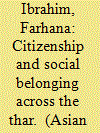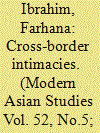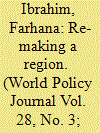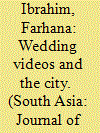| Srl | Item |
| 1 |
ID:
187441


|
|
|
|
|
| Summary/Abstract |
In this article, I examine the 1971 war (better known as the war for the liberation of Bangladesh) from a western Indian perspective. I argue that this war between India and Pakistan—while it focused overtly on the independence of East Pakistan—had some significant consequences for the western border between Kutch (in Gujarat state) and Sindh (in Pakistan). I suggest that this military conflict and the subsequent brief Indian occupation of Tharparkar in Sindh allows for a significant re-thinking of questions of citizenship, identity and belonging that were sparked off in 1947 and that have been re-ignited in the context of recent debates over the controversial Citizenship Amendment Act (CAA), enacted in December 2019.
|
|
|
|
|
|
|
|
|
|
|
|
|
|
|
|
| 2 |
ID:
161699


|
|
|
|
|
| Summary/Abstract |
This article examines intersections between sexuality, migration, and citizenship in the context of cross-border and cross-region marriage migration in Kutch, Gujarat, to underscore that women's mobility across borders is one site on which national cultural and political anxieties unfold. It argues that contemporary cross-region marriage migration must be located within the larger political economy of such marriages, and should take into account the historical trajectories of marriage migration in particular regions. To this end, it examines three instances of marriage migration in Kutch: the princely state's marriages with Sindh, nineteenth-century marriages between merchants from Kutch and women from Africa, and contemporary marriage migration into Kutch from Bengal. The article asks whether the relative evaluation of these marriages by the state can be viewed in relation to the settlement policies undertaken after partition, where borderlands were to be settled with those who were deemed loyal citizens. Finally, by historicizing marriage—as structure, but also aspirational category—it seeks to move away from the singularity of marriage as framed in the dominant sociological discourse on marriage in South Asia.
|
|
|
|
|
|
|
|
|
|
|
|
|
|
|
|
| 3 |
ID:
109000


|
|
|
|
|
| Publication |
2011.
|
| Summary/Abstract |
Ethnographic research conducted among the semi-nomadic Muslim Jatts, who inhabit the interstices of the contemporary State both discursively as well as physically, helps us to critically interrogate the formulation of region as articulated both by the modern nation-state as well as contemporary religious ideology. In the official discourse of Gujarat State, the Jatts are represented as threats to the territorial integrity of the nation-state in general and to Gujarat in particular, their cross-border movements into Pakistan designed to destabilise the region. An ethnographic analysis of the state shows how state ideologies are produced discursively over time. This paper argues that travel and trade links in this region have produced historically-blurred boundaries between region, religion and now nation. These histories productively re-configure the current geopolitical iteration of space and belonging in contemporary Gujarat as enunciated by the state.
|
|
|
|
|
|
|
|
|
|
|
|
|
|
|
|
| 4 |
ID:
157874


|
|
|
|
|
| Summary/Abstract |
An ethnographic illustration of post-disaster resettlement among Muslims in western Gujarat suggests that ‘moving on’ from the loss of home is a social rather than a state-directed process and that social intimacy is not necessarily produced in enclaves of religious sameness. Wedding videos filmed on the street in pre-earthquake times are not just representations of a past, but also affective and material modes of producing a community in resettlement. While resettlement has apparently led to ghettoisation and peripheralisation of the city's Muslims regardless of class, the paper argues that wedding videos are a mode of transcending such spatialisation and constitute visual and affective claims to the city in the context of post-disaster reorganisation of urban space.
|
|
|
|
|
|
|
|
|
|
|
|
|
|
|
|